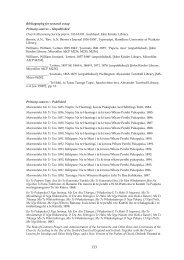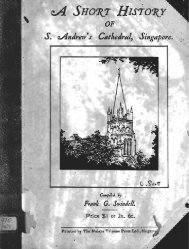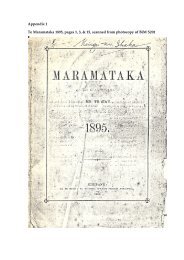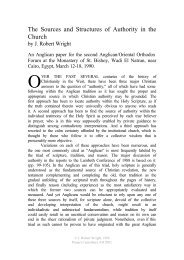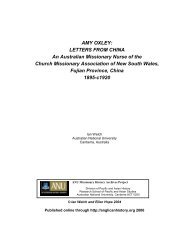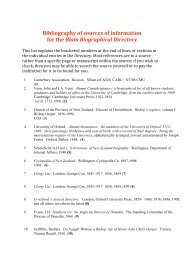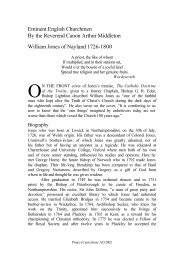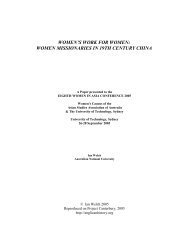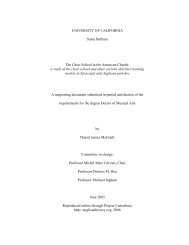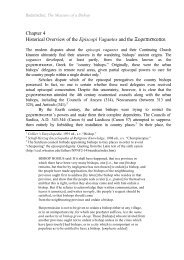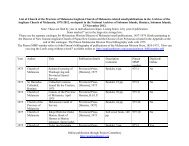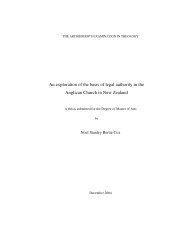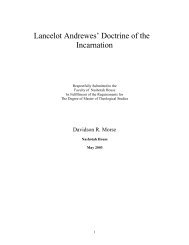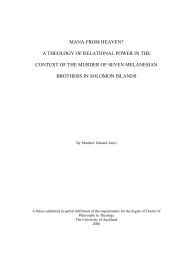Lancelot Andrewes - Project Canterbury
Lancelot Andrewes - Project Canterbury
Lancelot Andrewes - Project Canterbury
- No tags were found...
You also want an ePaper? Increase the reach of your titles
YUMPU automatically turns print PDFs into web optimized ePapers that Google loves.
<strong>Lancelot</strong> <strong>Andrewes</strong><br />
and<br />
THE BLESSED SACRAMENT OF THE ALTAR<br />
By Dr. Marianne Dorman<br />
The ordaining of His last sacrament, [is] ... the means to reestablish<br />
‘our hearts with grace,’ and to repair the decays of our spiritual<br />
strength; even ‘His own flesh, the Bread of life, ‘and ‘His own blood,’<br />
‘the Cup of salvation.’ Bread made of Himself, the true ‘Granum<br />
frumenti. Wine made of Himself, the true Vine.’ 1<br />
ANDREWES believed it was hardly possible to be a Christian if one<br />
did not receive the Sacrament regularly. Every Christian needs to<br />
partake of the Sacrament for many reasons, of which the chief is to<br />
receive the life of Our Lord. Other reasons are to be united with Christ, to<br />
renew our covenant, to be assured of the forgiveness of sin and to be united<br />
with fellow Christians, living and departed.<br />
The high regard that <strong>Andrewes</strong> had for the sacrament in the life of the<br />
Christian was evident in this Christmas sermon preached at St. Giles,<br />
Cripplegate, his parish church in London (now in the shadow of the Barbican).<br />
“We are said to come to Christ in Baptism, ... in the hearing of the word,” and<br />
in preaching, “but Christ receiveth none of these, but that we come to him as<br />
is panis vitae, when we come to Christ, as he offers himself in the<br />
Sacrament.” Christ gathers “us as close and near as alimentum alito, that is as<br />
near as near may be.” Indeed it is more, for by “that blessed union” it enables<br />
us to enter into “the highest perfection we can in this life aspire unto.” It is<br />
then at the altar that our faith is “at the highest; for when we have the body<br />
and blood of Christ in our hands, then it makes us say with Thomas ... Domine<br />
mi and Deus mi”. 2 It is no wonder then that <strong>Andrewes</strong> like Gregory of<br />
Nazianzus advocated frequent communion.<br />
Like the early Fathers, and indeed even Luther <strong>Andrewes</strong> believed<br />
exactly what our Lord said, “This is my body” and “This is my blood”, and<br />
that communicants receives Christ’s Body and Blood at the Eucharist,<br />
illustrated in his 1615 Christmas sermon when he spoke of the perpetual<br />
1 The Works of <strong>Lancelot</strong> <strong>Andrewes</strong>, eds. J. Bliss & J. P. Wilson, 11 vols. LACT (Oxford,<br />
1841—54), afterwards referred to as <strong>Andrewes</strong>, Vol. 1, p. 169.<br />
2 Apospasmatia Sacra: Or A Collection of posthumous and orphan Lectures: Delivered at St.<br />
Pauls and St. Giles his Church by the Right Honourable and Reverend Father in God <strong>Lancelot</strong><br />
Andrews, Lord Bishop of Winchester (London, 1657), afterwards referred to as Apos. Sacra,<br />
p. 597; <strong>Andrewes</strong>, Vol. 1, p. 281.
<strong>Lancelot</strong> <strong>Andrewes</strong> and the Blessed Sacrament of the Altar, by Dr. Marianne<br />
Dorman<br />
Bethlehem. Unlike the shepherds or wise men no one has to travel to “the<br />
town itself”, or “go out of this room” because “here is to be had the ‘true<br />
bread of life that came down from Heaven’. ... and where that Bread is, there<br />
is Bethlehem for ever.” <strong>Andrewes</strong> pointed out that was why in the early<br />
Church a star was engraved on the canister “wherein was the Sacrament of<br />
His body”. 3<br />
This belief was also very evident in that first Christmas sermon that<br />
<strong>Andrewes</strong> preached before James I in 1605 when he announced that Christ has<br />
taken our flesh, and on this day we partake of His flesh. By this partaking the<br />
union between Christ and us is closer than that of a wedded couple.<br />
For the Word He is, and in the word He is received by us. But that is<br />
not the proper of this day, unless there be another joined unto it. This<br />
day Verbum caro factum est. But specially in His flesh as this day<br />
gives it, as this day would have us. Now the bread which we break, is<br />
it not the partaking of the body, of the flesh, of Jesus Christ It is<br />
surely, and by it and by nothing more are we made partakers of this<br />
blessed union. ...Because He has so done, taken ours of us, we also<br />
ensuing His steps will participate with Him and with His flesh which<br />
He has taken of us. It is most kindly to take part with Him in that<br />
which He took part in with us, and that, to no other end, but that He<br />
might make the receiving of it by us a means whereby He might dwell<br />
in us, and we in Him. He taking our flesh, and we receiving His Spirit;<br />
by His flesh which He took of us receiving His Spirit which He<br />
imparts to us; that, as He by ours became consors humanae naturae, so<br />
we by His might become consortes Divinae naturae, partakers of the<br />
Divine nature. Verily, it is the most straight and perfect taking hold<br />
that is. No union so knits as it. Not consanguinity; brethren fall out.<br />
Not marriage; man and wife are severed. But that which is nourished,<br />
and the nourishment wherewith—they never are, never can be severed,<br />
but remain one for ever. With this act then of mutual taking, taking of<br />
His flesh as He has taken ours, let us seal our duty to Him this day, for<br />
taking not angels, but the seed of Abraham. 4<br />
3 Ibid., Vol. 1, pp. 173, 247, Vol. 2, p. 362.<br />
4 Ibid., Vol. 1, pp. 16–7.<br />
<strong>Project</strong> <strong>Canterbury</strong>, AD 2002
<strong>Lancelot</strong> <strong>Andrewes</strong> and the Blessed Sacrament of the Altar, by Dr. Marianne<br />
Dorman<br />
Christmas is indeed a special time to reflect on the Sacrament, that time when<br />
the Word became flesh was inseparable from the altar, as reflected in his<br />
sermon for Christmas, 1612. “And this day they first came together, the Word<br />
and flesh; therefore, of all days, this day they would not be parted.” Two years<br />
later he concluded his Nativity sermon with this commendation. “This then I<br />
commend to you, even the being with Him in the Sacrament of His Body—<br />
that Body that was conceived and born, as for the other ends so for this<br />
specially, to be ‘with you’; and this day, as for other intents, so even for this,<br />
for the Holy Eucharist.” 5 And so it is not surprising that most of his sermons<br />
given at the Royal Court ended with interweaving of the particular festival<br />
with receiving Christ at the celebration of the Eucharist. Of course it was his<br />
Nativity sermons that especially expressed this union when we celebrate “the<br />
Word became flesh”. Thus he concluded his 1610:<br />
Let us honour this day with our receiving, which He has honoured by<br />
His first giving; yielding Him evermore ... our unfeigned hearty<br />
thanksgiving for this so good news, for this so great a gift, both of<br />
them this day [given to] us; in Him and for Him, Who was Himself the<br />
gift, our Saviour, Christ the Lord. 6<br />
The next Christmas he would conclude in a similar vein:<br />
To go to the word and flesh together. ... But at this now, we are not to<br />
content ourselves with one alone; but since He offers to communicate<br />
Himself both ways, never restrain Him to one. The word we hear is the<br />
abstract of Verbum; the Sacrament is the antetype of caro, His flesh.<br />
What better way than where these are actually joined, actually to<br />
partake them both Not either alone, the word or flesh; but the word<br />
and flesh both, for there they are both. ... If it be grace and truth we<br />
respect, how may we better establish our hearts with grace, or settle<br />
our minds in the truth of His promise, than by partaking these the<br />
conduit-pipes of His grace, and seals of His truth unto us Grace and<br />
truth now proceeding not from the Word alone, but even from the flesh<br />
thereto united; the fountain of the Word flowing into the cistern of His<br />
5 Ibid., pp. 116, 151–2.<br />
6 Ibid., p. 84.<br />
<strong>Project</strong> <strong>Canterbury</strong>, AD 2002
<strong>Lancelot</strong> <strong>Andrewes</strong> and the Blessed Sacrament of the Altar, by Dr. Marianne<br />
Dorman<br />
flesh, and from thence deriving down to us this grace and truth, to<br />
them who partake Him aright.<br />
But setting them aside, the day the Word was made flesh it is<br />
most kindly that a memorial be kept, as well of the flesh as the Word.<br />
On the feast of their union, they would be united; the day they were<br />
joined by Him, they would not be sundered by any; but we to celebrate<br />
both, in honour of both, ... that we may hold this feast aright, and do<br />
the duty that properly belongs to it, let us by both do honour to both,<br />
that from both we may receive the fruit of both—grace, to enable us;<br />
truth, to guide us to the hope of glory,... [and thus] to see Him as He is,<br />
and by seeing to be transformed into the same image of glory. 7<br />
When <strong>Andrewes</strong> preached on covenantal theology it was from a<br />
sacramental approach. Our covenant with God is first made in baptism, the<br />
first seal. But as this covenant is constantly broken by sin, it has to be renewed<br />
just as constantly, which it can in the receiving of the Sacrament, the second<br />
seal. “We know the Sacrament is the seal of the new covenant, as it was of the<br />
old. Thus, by undertaking the duty He requires, we are entitled to the comfort<br />
which here He promises. And do this He would have us, as is plain by His hoc<br />
facite.” So the Sacrament in<br />
all the times in our life, when we settle ourselves to prepare<br />
thitherwards, we are in best terms of disposition to covenant with Him.<br />
For if ever we be in a state of love towards Him, or towards one<br />
another, then it is. If ever troubled in spirit, that we have not kept His<br />
commandments better, then it is. If ever in a vowed purpose and<br />
preparation better to look to it, then it is. Then therefore of all times<br />
most likely to gain interest in the promise, when we are best in case,<br />
and come nearest to be able to plead the condition. 8<br />
Calvary and the altar were also inseparable. At Calvary His death was<br />
made “the medicine”, of which “the Water and the Blood” flowing from His<br />
wounded side were “to be the ingredients” for what Augustine described as<br />
the “twin sacraments”. This <strong>Andrewes</strong> illustrated in his 1597 Passion sermon<br />
7 Ibid, pp. 101–1.<br />
8 Ibid, Vol. 3, p. 161.<br />
<strong>Project</strong> <strong>Canterbury</strong>, AD 2002
<strong>Lancelot</strong> <strong>Andrewes</strong> and the Blessed Sacrament of the Altar, by Dr. Marianne<br />
Dorman<br />
when he took Zechariah’s words [Zec. 13.1] that “out of His pierced side God<br />
‘opened a fountain of water to the House of Israel for sin and for<br />
uncleanness;’ of the fullness whereof we all have received in the Sacrament of<br />
our Baptism.” Of “‘the blood of the New Testament’ we may receive this day;<br />
for it will run in the high and holy mysteries of the Body and Blood of Christ.<br />
There may we be partakers of the flesh of the Morning Hart, as upon this day<br />
killed. There may we be partakers of ‘the cup of salvation,’ ‘the precious<br />
blood’ ‘which was shed for the remission of our sins.’” 9<br />
Again like the early Fathers, <strong>Andrewes</strong> stressed the unifying nature of<br />
the Sacrament. It is the “Sacrament of peace and unity”, he preached, and<br />
therefore ideally the Eucharist should be the meeting place for all Christians.<br />
It is “for all sorts”, <strong>Andrewes</strong> insisted, but nothing had divided his<br />
contemporaries, as it still does to-day, as much as over Christ’s Body and<br />
Blood. Yet at the Liturgy God’s people gather together for prayers and for<br />
“the dispensation of His holy mysteries”. That gathering should reflect “the<br />
symbols of many grains into the [bread] ... and many grapes into the [wine]”<br />
which is completed at the altar where “we gather Christ Himself”. The<br />
importance of coming together as one, <strong>Andrewes</strong> pointed out, is reflected in<br />
one of the names given for the Eucharist in the early Church, Synaxis. 10<br />
This concern for unity was particularly evident in some of his lectures<br />
at St. Giles’. In one of these he compared the fraction of Christ’s body with<br />
that which Paul addressed in the Corinthian Church when he appealed to the<br />
schismatics and contentious at Corinth to live in “love and concord” with one<br />
another. Paul’s reason for pressing unity was that they were all “one body” in<br />
Christ who is the head and only source of Christians’ “one beginning and one<br />
nourishment”. That beginning is “in the fountain of regeneration” when we<br />
are “baptized into one body by one spirit, and all made to drink of one spirit.”<br />
After that Christians come together in “the Sacrament of accord”. Such accord<br />
was seen in the Apostles as they broke bread together and “in the many grains<br />
kneaded into one loaf, and the many grapes pressed into one cup”, a quotation<br />
from Cyprian, used not only by <strong>Andrewes</strong> but by many theologians of his day.<br />
This unity is also demonstrated at the fraction when Christ’s body is broken<br />
for all, and as St. Paul said, “We are all ‘one bread and one body, so many as<br />
are partakers of one bread.’” This makes it “locus of unity”. Furthermore just<br />
9 Ibid., p. 113, Vol. 2, p. 134.<br />
10 Ibid., Vol. 1, pp. 281—2.<br />
<strong>Project</strong> <strong>Canterbury</strong>, AD 2002
<strong>Lancelot</strong> <strong>Andrewes</strong> and the Blessed Sacrament of the Altar, by Dr. Marianne<br />
Dorman<br />
as the two natures in Christ are “united together” so in the Sacrament all<br />
Christians should be united. Like St. Paul, <strong>Andrewes</strong> insisted that if Christians<br />
could be persuaded they are partakers of the one Body of Christ and members<br />
of that Body “there would not be such divisions and dissensions in the World<br />
as they are”. <strong>Andrewes</strong> always maintained that we cannot ideally participate<br />
in the Sacrament unless we earnestly desire union with one another which<br />
makes our participation active rather than passive as Christians are meant to<br />
be “living stones” in that “body mystical” by growing in “mutual love and<br />
charity.” 11<br />
At a time when the Calvinist doctrine of predestination abounded,<br />
<strong>Andrewes</strong> preached incessantly on the universality of redemption and grace.<br />
Never is this teaching more transparent than in his eucharistic teaching. In this<br />
lecture delivered at St. Giles in 1599 he stressed that all who come to Him,<br />
receive Him, despite who they are. No one is excluded from His banquet<br />
because we are all sinners. “We come to Christ, as he offers himself in the<br />
Sacrament to be the lively food of our souls.” Christ will not “cast out” any<br />
who come, but rather he will be “received to be a member of Christs mystical<br />
body, ‘and partaker of the divine nature’”. He also emphasised that if ever we<br />
are going to be “contrite and broken in spirit” it is in the context of the<br />
Eucharist. Of course another reason for sinners to come to the Sacrament is to<br />
receive “active grace” in order to resist sin, to endure “the conflict of sinne,<br />
and to be conquerors over Satan and own our corruptions”. <strong>Andrewes</strong> also<br />
emphasised that the ancient Fathers had noted that there is “no unworthinesse<br />
by means of any filth, either of body or soul”, will keep Christ “from us”. In<br />
His incarnate life Christ showed for “bodily uncleannesse, he was content to<br />
be received by Simon the leper, ...and... in regard of spirituall pollution ...<br />
Christ ... doth not only receive sinners, but ‘eats with them’.” Thus the<br />
sinners’ assurance is that Christ not only eats with them “but receives them<br />
into that union, that is, to be one with him; which is a greater union that is<br />
either between brother and brother or between man and wife.” Another<br />
assurance is that at Calvary Christ “was content to receive the thief”, where he<br />
also prayed “‘Father forgive them.’” “Therefore it is most likely that he will<br />
11 Ibid., p. 282, Vol. 2, p. 289; Apos. Sacra, p. 614; Cyprian, The Epistles Of S. Cyprian, L.F.<br />
Vol. 17 (Oxford: J. H. Parker, 1844), p. 161 (lxiii.10).<br />
<strong>Project</strong> <strong>Canterbury</strong>, AD 2002
<strong>Lancelot</strong> <strong>Andrewes</strong> and the Blessed Sacrament of the Altar, by Dr. Marianne<br />
Dorman<br />
receive us, if we come to him.” As the Fathers also emphasised, the only<br />
condition is “‘that we come.’” 12<br />
And what if in coming the communicant is an unrepentant sinner<br />
<strong>Andrewes</strong> does not explicitly say, except he still receives “the body and<br />
blood” of our Lord, but he implicitly implies that it is to his damnation. And<br />
what of those who do not come <strong>Andrewes</strong> believed though they deserve to be<br />
cast out, “yet Christ doth not cast them out, but they cast out themselves, in as<br />
much as they sever themselves from this Sacrament and from the memorial of<br />
his loving kindness.” He insisted that they who do not come to the Eucharist<br />
are heathenish, and are no better than Jews and Turks. If they want to “be<br />
bidden to the Lambs Supper” then it is imperative they “come to the Lords<br />
Supper”, but if they “neglect the opportunity, they shall be cast out, as Saul<br />
was.” It also reflects another of his favourite themes, Paul’s teaching, though<br />
“sin abounds, grace superabounds”. By coming to Christ in the Sacrament<br />
Christians providing they show some contrition are assured of forgiveness by<br />
receiving the cup of Salvation. He again followed St. Paul’s teaching that<br />
when our lips touch “the cup of blessing” our sins are purged, bringing<br />
healing and forgiveness. We must therefore never underestimate the power of<br />
God that in Christ “that our sins shall be taken away by the outward act of the<br />
sacrament.” 13 Just as the Sacrament is for sinners, it is also the remedy against<br />
sin; it is the antidote against the wiles of Satan as it assures us that Christ as<br />
“the seed of the woman” has vanquished “the seed of the Serpent”. 14<br />
Thus the Blessed Sacrament restores man to his rightful nature.<br />
<strong>Andrewes</strong> taught this in another of his favourite images, “the tree of life”.<br />
Adam by being cast out of the garden was “kept from the tree of life”, the<br />
original sacrament, but was restored with the second Adam. He restored the<br />
original purpose of the tree in the garden, which was to give eternal life, and<br />
now unlike Adam we are not barred from that “tree of life” that is freely given<br />
by partaking in the life of the second Adam who “is a Paradise of all joyes and<br />
12 Apos. Sacra, pp. 596—7, 601. He preached in a similar vein in his first Christmas sermon at<br />
the Jacobean court. Verily, it is the most straight and perfect ‘taking hold’ that is. No union so<br />
knitteth as it. Not consanguinity; brethren fall out. Not marriage; man and wife are severed.<br />
But that which is nourished, and the nourishment wherewith—they never are, never can be<br />
severed, but remain one for ever. <strong>Andrewes</strong>, Vol. 1, pp. 16—7.<br />
13 Apos. Sacra, pp. 519—20, 600, 624.<br />
14 Ibid., p. 683.<br />
<strong>Project</strong> <strong>Canterbury</strong>, AD 2002
<strong>Lancelot</strong> <strong>Andrewes</strong> and the Blessed Sacrament of the Altar, by Dr. Marianne<br />
Dorman<br />
happinesse.” “By eating the flesh of Christ, the first fruits of life” we<br />
overcome death in the “first Adam” by becoming “branches of the Vine.”<br />
Hence we are “partakers of His nature, and so of His life and verdure both.”<br />
That Sacrament is the dispenser of life, life from “the fruit of the Tree in<br />
Paradise” as well as life from the Living Bread, that is the flesh of Son of<br />
God. All this Christ has promised providing we are faithful; if not, like Adam<br />
we shall be forbidden entrance by the angel holding a “fierie sword”. This<br />
means we must “strive to overcome ... every temptation”. When we fall from<br />
grace “we obtain victory again sinne and death by the blood of the Lamb,<br />
being drunk in the Sacrament.” 15<br />
One of his favourite texts in his teaching on participation in the<br />
Eucharist was from St. John’s discourse on “I am the Bread of Heaven”.<br />
Accordingly in a lecture at St. Giles’, he taught that they were “to Labour not<br />
for that bread which perisheth but Labour for that which endureth;” the first<br />
kind cannot endure for long before it perishes, but the bread for the soul never<br />
does. It never perishes because “it is Christ, the Sonne of man, that gives us<br />
this bread of life”. “Therefore it stands us upon to come to Christ, that he may<br />
receive us to be one with him in the life of grace, and partakers with him in his<br />
kingdom of glory.” We must never forget that Our Lord “commands us not<br />
only to seek and desire in our hearts” this everlasting Bread, “but to hunger<br />
for it as we doe for the food of our bodies”. 16<br />
Another of <strong>Andrewes</strong>’ favourite themes was theosis, that is, man<br />
becoming like God of which the main was by receiving Christ’s body and<br />
blood. “He is in us and we in him, we and Christ are made one, we receive<br />
him and he receives us: So that as God cannot hate Christ, so he cannot but<br />
love us, being engrafted into him.” Hence through the Sacrament we are<br />
absorb His nature. <strong>Andrewes</strong> saw the fraction as the visual teaching for the<br />
fusing of the divine and human. “Now ‘the bread which we break, is it not the<br />
partaking of the body, of the flesh, of Jesus Christ’ It is surely, and by it and<br />
by nothing more are we made partakers of this blessed union. ... Because He<br />
hath so done, taken ours of us, we also ensuing His steps will participate with<br />
Him and with His flesh which He hath taken of us. It is most kindly to take<br />
part with Him in that which He took part in with us, and that, to no other end,<br />
but that He might make the receiving of it by us a means whereby He might<br />
15 <strong>Andrewes</strong>, Vol. 2, p. 220; Apos. Sacra, pp. 573—4.<br />
16 Ibid., pp. 531, 534, 537, 601.<br />
<strong>Project</strong> <strong>Canterbury</strong>, AD 2002
<strong>Lancelot</strong> <strong>Andrewes</strong> and the Blessed Sacrament of the Altar, by Dr. Marianne<br />
Dorman<br />
‘dwell in us, and we in Him.’” His theosis teaching mirrored the Orthodox<br />
Church on this. Gregory of Nyssa had taught that “He disseminates Himself in<br />
every believer through that flesh, whose existence comes from bread and<br />
wine, blending Himself with the body of believers, to secure that, by this<br />
union, with the immortal, man, too, may be sharer in incorruption.” A few<br />
centuries later Gregory Palamas wrote by “partaking of the body and blood of<br />
His humanity, we receive God Himself in our souls—the Body and Blood of<br />
God.” 17 The Sacrament is also the source of comfort in our pilgrimage to the<br />
Supper of the Lamb. In his 1610 Pentecost sermon <strong>Andrewes</strong> explicitly taught<br />
how the Church teaches us that that Sacrament was ordained for “our<br />
comfort” for we hear it read so often: “‘He hath ordained these mysteries of<br />
His love and favour, to our great and endless comfort’”, and “‘The Father<br />
shall give you the Comforter.’” That Comforter is Christ, and so “by the flesh<br />
we eat, and the blood we drink at His table, we be made partakers of His<br />
Spirit, and of the comfort of it.” The comfort we receive can be ascertained in<br />
that bread itself strengthens or makes strong, and comfort means “to make<br />
strong”, while wine, cheers and gladdens the heart and therefore comforts<br />
those who “mourn and are oppressed with grief.” The outward symbols “show<br />
that the same effect is wrought in the inward man by the holy mysteries,... that<br />
there the heart is ‘established by grace, and our soul endued with strength, and<br />
our conscience made light and cheerful, that it faint not, but evermore rejoice<br />
in His holy comfort.” 18 He continued in this sermon:<br />
Besides, it was one special end why the Sacrament itself was ordained,<br />
our comfort; the Church so tells us, we so hear it read every time to us:<br />
He has ordained these mysteries of His love and favour, to our great<br />
and endless comfort. The Father will give you the Comforter. Why He<br />
gives Him, we see; how He gives Him, we see not. The means for<br />
which He gives Him, is Christ—His entreaty by His word in prayer;<br />
by His flesh and blood in sacrifice, for His blood speaks, not His voice<br />
only. These means for which; and the very same, the means by which<br />
He gives the Comforter: by Christ the Word, and by Christ’s body and<br />
17 <strong>Andrewes</strong>, Vol. 1, p. 16; Apos. Sacra, p. 600; J. Meyendorff, Byzantine Theology (New<br />
York, 1983), pp. 201, 205.<br />
18 <strong>Andrewes</strong>, Vol. 3, pp. 161—2.<br />
<strong>Project</strong> <strong>Canterbury</strong>, AD 2002
<strong>Lancelot</strong> <strong>Andrewes</strong> and the Blessed Sacrament of the Altar, by Dr. Marianne<br />
Dorman<br />
blood, both. In tongues it came, but the tongue is not the instrument of<br />
speech only but of taste, we all know. ... That not only by the letter we<br />
read, and the word we hear, but by the flesh we eat, and the blood we<br />
drink at His table, we be made partakers of His Spirit, and of the<br />
comfort of it. 19<br />
The Supper of the Lord leads us to the Supper of the Lamb. It is in his Paschal<br />
sermons that <strong>Andrewes</strong> emphasised how the Passover Supper anticipates the<br />
Supper of the Lamb, which will be a perpetual feast of joy.<br />
There is a further matter ... for as this feast looks back as a memorial<br />
of that is already past and done for us, so does it look forward, and is<br />
to us a pledge of another and a better yet to come, the feast of the<br />
marriage of the Lamb here who is our Passover, where whosoever<br />
shall be a guest, the angels pronounce him happy and blessed for ever.<br />
That is the last and great feast indeed, when all destroyers and<br />
all destructions will cease and come to an end for evermore, and we<br />
hear that joyful voice, Transi in gaudium Domini, Passover into the<br />
joy of the Lord, the joys of heaven, joys not mingled with any sour<br />
leaven as this world’s joy is, but pure and entire; not transient as that<br />
of this world, and ever flitting and forsaking us then soonest when we<br />
think we have best hold of them, but permanent and abiding still. A<br />
Passover that will never be passed over, but last and continue as feast<br />
to all eternity. Of that, this here is a pledge, if we neglect it not as it<br />
were not worth the taking. And He who at this time gave us this<br />
pledge, in His good time also bring us to the Passover whereof this is<br />
the pledge, even to the never-passing but everlasting joys and<br />
happiness, of His heavenly kingdom, through the offering of His<br />
blessed Son the very Paschal Lamb!” 20<br />
Undoubtedly we Christians are the happiest of all people “in this valley of<br />
tears”.<br />
So it is “in this Sacrament we have both a means of victory and a<br />
pledge of our reward, that is, the life of grace begun in us here, to assure us of<br />
19 Ibid.<br />
20 Ibid., Vol. 2, p. 308.<br />
<strong>Project</strong> <strong>Canterbury</strong>, AD 2002
<strong>Lancelot</strong> <strong>Andrewes</strong> and the Blessed Sacrament of the Altar, by Dr. Marianne<br />
Dorman<br />
a glorious life in the world to come.” Just as “every tree must have a root, so<br />
Christ speaks of the Sacrament being a root when it is sown “in the hearts of<br />
the receivers”. In time through the work of the Holy Spirit it “shoots forth and<br />
becomes a tree” giving “a life of grace”. In due time from this “life of grace”<br />
we shall receive, when our bodies are raised up from “the dust of death”, “the<br />
life of glory” in “the heavenly Paradise”. In this sense for <strong>Andrewes</strong> the<br />
Sacrament is the bridge between “the Church Militant” and “the Church<br />
Triumphant”. 21<br />
21 Apos. Sacra, pp. 576—7.<br />
<strong>Project</strong> <strong>Canterbury</strong>, AD 2002



